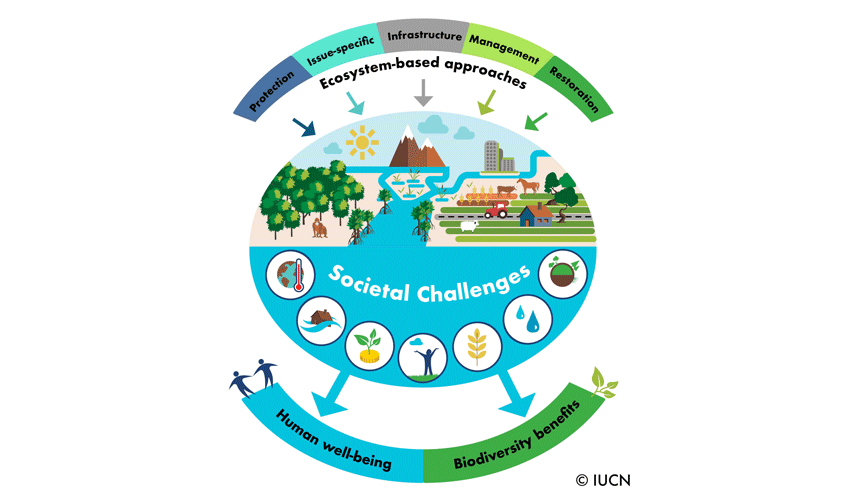- Nature-based Solutions (NbS) are actions to address societal challenges through the protection, sustainable management and restoration of ecosystems, benefiting both biodiversity and human well-being.
- Until now, there has been no agreed framework or standard as to what constitutes an effective NbS.
- Misunderstanding and misuse of NbS have led to applications that cause harm to biodiversity and communities and threaten to erode stakeholders’ trust in the approach.
- The IUCN Global Standard for NbS is a tool to help governments, communities, business and NGOs implement strong, effective NbS projects that are ambitious in scale and sustainable, prevent misuse and safeguard people and planet.
Increased demand and use of NbS has led to cases of misuse of the NbS concept, where even good intentions can result in harm to nature and people. In the worst-case scenarios, misuse runs the risk of damaging biodiversity, eroding the nature that we depend upon for services such as clean water and food.
For example, a tree-planting climate mitigation project using just one non-native species could create poor soils, ultimately degrading biodiversity and making it more costly or impossible to sustain the forest in the future. Similarly, restoring a mangrove forest to reduce the risk of storm damage could be doomed from the start if upstream and downstream processes are not considered. Lack of consideration of water use can lead to restored ecosystems using too much water, creating pressure on local communities. Failure to take into account social and economic factors has meant that even seemingly successful pilot applications of NbS have ultimately not been sustainable outside of the timeframe of a project.
 A failed mangrove restoration that did not take into account the sedimentation and erosion processes in the bay. Addressing Criterion 2 of the Global Standard (Design at Scale) would have resulted in a healthy coastal ecosystem reducing storm damage and providing jobs for local communities.
Photo: © Daisy Hessenberger
A failed mangrove restoration that did not take into account the sedimentation and erosion processes in the bay. Addressing Criterion 2 of the Global Standard (Design at Scale) would have resulted in a healthy coastal ecosystem reducing storm damage and providing jobs for local communities.
Photo: © Daisy Hessenberger
If NbS are only implemented as uncoordinated small-scale pilots and applications, their substantial potential to address societal challenges will not be fulfilled. Worse, weak or mislabelled NbS projects can water down the case for the NbS approach, de-incentivising its use, eroding donor confidence and misdirecting efforts.
Funders, investors and decision makers need to be confident that the NbS initiatives they support are effective and scalable and consider potential externalities. Yet many may lack the resources or expertise to analyse and evaluate NbS projects.



